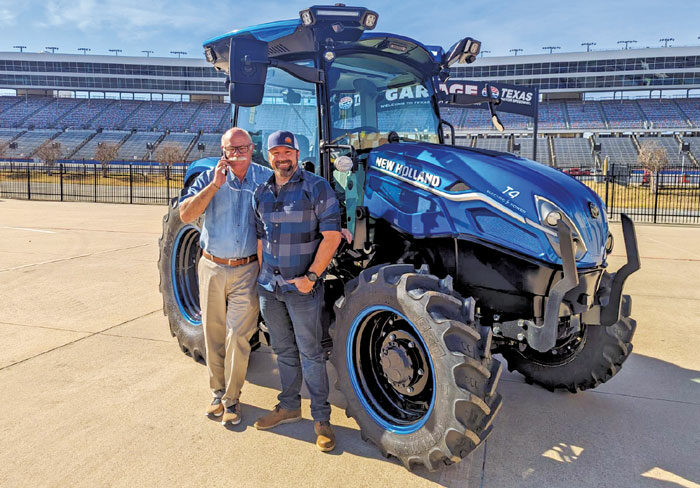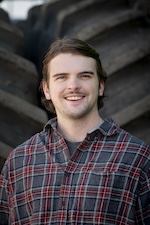When Francis “Sonny” Rianda started Coastal Tractor in 1971, it was originally called Coastal Ford Tractor. Nearly 15 years later, Ford purchased New Holland and created the Ford-New Holland brand. It would later sell the company again but the Ford blue color always remained the same and so did Sonny’s main purpose for doing business: taking care of his customers and helping farmers of every different experience level in California’s Salinas Valley find the solutions that best suited them.
Now more than 50 years since the dealership was founded, Sonny Rianda’s son, Mike, and his grandson, Jake, are still committed to his original goal while operating 3 locations across a 50-mile radius on California’s central coast. Currently, Coastal Tractor still sells New Holland equipment as its main line as well as more than a dozen different shortlines including Bush Hog, Kawasaki, Kuhn and Unverferth.
Embracing Change
But a lot has changed in the world of farm equipment since 1971. And while it can be difficult to keep up with the fast-moving industry, the Riandas have embraced these changes.
“Going back to when Coastal Tractor started in 1971, our dealership was always a mod shop,” says Jake Rianda, the dealership’s precision farming specialist. “So we would take what was given to us and find a way to make it work.”
Jake says that in some ways, his job now in the precision department is not all that different from the way the mod shop worked back in the day.
“Our main focus is finding solutions for farmers that will help increase efficiencies across the board whether it be a mechanical solution all the way up to a highly precision robotics solution,” Jake says.
“Embracing new technologies is the only way to increase efficiency…”
Coastal Tractor has had its precision farming department for more than 20 years. The company first started out with Trimble and has since implemented Raven and Stout technologies into its repertoire, including a semi-autonomous weeder from Stout that the dealership has now carried for just over a year. Jake says that anytime the dealership decides to carry a new piece of technology, that decision making process is focused heavily on asking the question of “what already existing problem does this equipment solve for the farmer?”
In the case of the Stout semi-autonomous weeder, Jake says that it solves a labor-shortage problem and has a very quick ROI for a farmer.
“You’re able to cut out a hand crew and get more reliability back,” Jake says. “It turns into a 10-20 person operation to go through and weed in between plants in row and this machine cuts that down to a one person operation. These decisions always come down to looking at the company who makes the product, evaluating their goals and whether or not they’re able to solve a problem efficiently rather than having a tech company create a solution to a problem that doesn’t exist.”
Besides solving a labor shortage problem, there are other reasons why Coastal Tractor has decided to embrace new technology. According to Jake, they understand where the future of the agricultural industry is headed and they want to be prepared.
“Part of the reason this is such a big deal is because smart implements like Stout and some of the Raven technology are the exact types of products that will help enable the pathway to autonomy for menial tasks,” Jake says. “When we get to the bigger stuff like fully autonomous tractors — which is coming but California has to get out of their own way legislatively — once that happens, we’ve already got a roadmap to effectively utilize it.”
Throughout the 20 years that Costal Tractor has had their precision department, Jake has noticed a lot of change in the way the department has functioned.
“20 years ago this part of the industry was exclusively looked at from a mechanization standpoint,” Jake says. “I think that data management is the next big step for this industry. We want to facilitate that relationship with a farmer to where they can run through our dealership and have us be their partner for their operation and their data collection. If we can help a farmer analyze data and put it in a more palatable form, that is ultimately going to be the success of the precision space.”
Jake says customers are going to go where they can get their data, and whether it’s yield data or in-season agronomic data, he believes farmers will eventually gravitate toward dealers who can provide the information that can show them how efficient or inefficient their operation is.
“That is my big goal right now — to get more effective on work order management and then get more machine records that are digitized so that they can utilize us and we can effectively help them decide whether a machine's worth fixing or not,” Jake says.
Family Matters
Much like his late grandfather Sonny, Jake says the most rewarding part of his job is being able to establish a genuine relationship with his customers and know that he is making a positive impact on their farming operation.
“Helping a farmer save money is the best part for me,” Jake says. “It’s about developing a true friendship with them and rather than just selling them any solution, putting an emphasis on selling them the right solution and building that solution to help cater to the needs of their operation.”
Mike Rianda says that the family-oriented aspect of his dealership has always been and always will be something that sets Coastal Tractor apart from other dealerships.
“We are the only family-owned tractor dealership in the Salinas Valley,” Mike says. “I’m the fourth generation in the valley, and we were farmers before we were dealers.We understand the type of growing that is done here and the intensity that farmers are under, and we try to instill that back into our employees on the tractor side so that we can provide top-notch service and keep all our farmers up and running.”
Being a family business through multiple generations, it would have been easy for Coastal Tractor to get stuck doing things the old fashioned way and fail to keep up with technological advancements in the industry. But according to Jake, the reason they’ve been able to keep up is because they’ve never stopped focusing on efficiency.
“We don’t want a tech company that’s creating solutions to problems that don’t exist…”
When Sonny Rianda started the dealership, it was a means to supplement his own farming operation and his focus was on finding more efficient machinery to get the job done. Then when Mike came into the picture, his generation was focused on the mechanization movement and finding better implements. Now that Jake and his brothers are heavily involved with the family business, it’s about embracing new technology.
“Embracing new technologies is the only way to increase efficiency at this point,” Jake says. “Each one of those steps that my father and grandfather took along the way was all about increasing efficiency. This is the next logical step in increasing the efficiency of farming and we attack everything from ‘what’s best for the farmer?’”
Being Prepared
While Coastal Tractor has done a good job of keeping up with trends in the industry, Mike says it’s important to maintain that focus on the future and not get complacent. In the blink of an eye, new issues can arise and a dealership has to have a plan for the future. Many dealerships foresee interest rates and movement of new equipment being a challenge in the next year or two, but labor supply is something that has been especially difficult for dealers in California’s central coast region. Mike says Coastal Tractor has a unique plan to stay on top of that challenge.
The dealership decided to make its presence known this past summer at FIRA USA, an annual conference focused on the future of agriculture and the technology that could be implemented into the industry in the coming years.
“Because this event is essentially in our own backyard, I wanted to make a presence here,” Mike says. “I understand the agronomy aspect of the technology side and I think a lot of these startups don’t have a great understanding of that portion.”
Coastal Tractor has partnered with certain start-ups and agronomy groups, including Agtonomy, in order to try and act as an advisor and help make their products and services better from a farming standpoint.
Being present at an event like FIRA was also a means to try and appeal toward students who might have a future working in agriculture, Mike says.
“Technician recruiting for technology is especially tough in our area,” he says. “We have all these startups right up the road and kids get out of school and they go to a startup. They think of agriculture and they say ‘I don’t want to work in the dirt.’ Events like FIRA help show that there is so much potential in the ag industry.”







